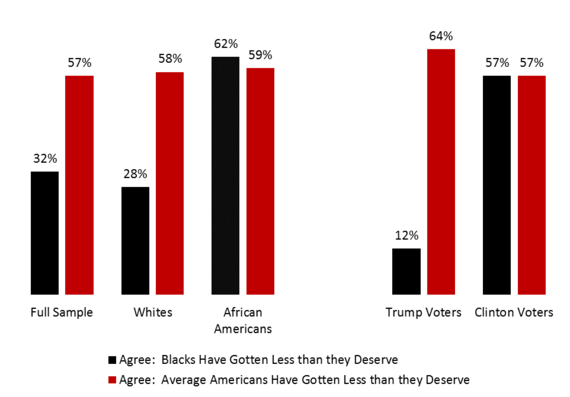Michael Tesler on the data behind racial resentment

In a recent piece for the Huffington Post, Michael Tesler (author of Post-Racial or Most Racial?: Race and Politics in the Obama Era) analyzes public opinion data that corroborates an account of the 2016 election that looks beyond the white-working class neglect narrative and concentrates instead on the role played by racial prejudice. As he summarizes, “Racially resentful beliefs that African Americans are getting more than they deserve were so strongly linked to support for Trump, in fact, that their impact on both the 2016 Republican Primary and the general election were larger than they had ever been in before.” Read an excerpt from Tesler’s research below, which runs the numbers and frames the context in which they were generated.
***
Such different portraits of white and non-white Americans’ grievances have their origins in what social psychologists call “ultimate attribution error.” This error means that when whites struggle, their troubles are generally attributed to situational forces (e.g., outsourcing); but when non-whites struggle, their plight is more often attributed to dispositional traits (i.e., poor work ethic). Consequently, whites are considered “more deserving” than blacks.
To quantify this double standard in deservingness we embedded an experiment in a new HuffPost/YouGov survey. We asked half of our respondents if they agreed or disagreed with the following statement: “Over the past few years, blacks have gotten less than they deserve.” The other half of the sample was provided with the exact same statement, except we changed “blacks” to “average Americans”—a group that psychology research shows is implicitly synonymous with being white.
The results show a very strong public divide in the perceived deservingness of average Americans and African Americans:
A clear majority (57 percent) in the survey said that average Americans aren’t getting their fair share in society. But only 32 percent agreed when that same statement applied to African Americans.
The display further shows that this disparity in the perceived deservingness of average Americans and African Americans was even more pronounced among whites. Whites were thirty percentage points more likely to say that average Americans aren’t getting what they deserve, compared to African American Americans (58 percent to 28 percent respectively).
The biggest double standard in deservingness, though, occurred for Trump voters. Almost two-thirds of Trump voters said that average Americans aren’t getting as much as they deserve; only 12 percent of Trump supporters said blacks have gotten less than they deserve.
>>> To read Tesler’s piece for the Huffington Post in full, click here.
***
To read more about Post-Racial or Most Racial?, click here.
